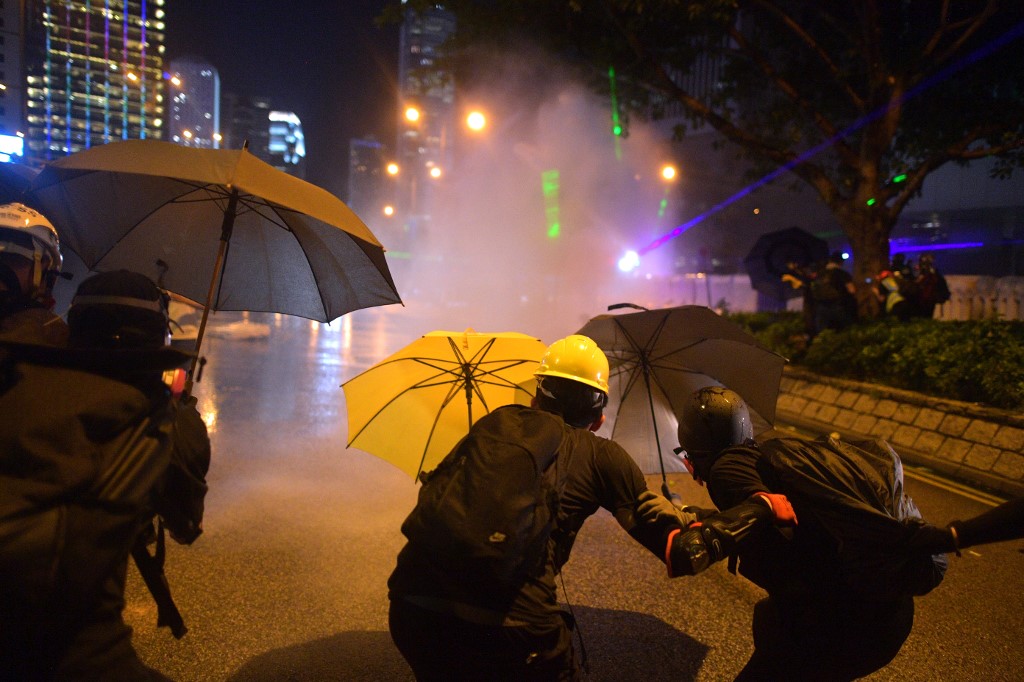Hong Kong crisis threatens to spoil China’s 70th party

Protesters protect themselves after police fired water cannon toward them after the group occupied a main road in the Admiralty area in Hong Kong on September 28, 2019, on the fifth anniversary of the “Umbrella Movement”. (Photo by Nicolas ASFOURI / AFP)
BEIJING, China — China’s tightly choreographed 70th birthday bash next week risks being upstaged by pro-democracy protests in Hong Kong, which offer a starkly different take on the strength and power of the Communist Party being feted in Beijing.
As President Xi Jinping gets ready to preside over a huge military parade and gala event on Tuesday, the former British colony is in tumult over the erosion of its special freedoms by Beijing.
Hong Kong has been rocked by the worst political unrest since its handover to China in 1997, with police firing tear gas and rubber bullets to disperse increasingly violent protesters.
The city’s summer of discontent — first triggered by an extradition bill to the mainland that has since been shelved — has morphed into a call for free elections and less intervention from Beijing.
With tanks and military aircraft to parade in Beijing on October 1, Hong Kong protest organisers have promised their own major rallies.
Article continues after this advertisement“It’s safe to say that the Hong Kong protests have already wrecked the (Communist) Party’s party even before it’s begun,” said author and activist Kong Tsung-gan.
Article continues after this advertisementUnder the policy of “one country, two systems”, China has offered tiny Hong Kong certain liberties denied to citizens on the mainland -– including freedom of expression, unfettered access to the internet and an independent judiciary.
But the arrangement is due to expire in 2047.
The financial hub has seen waves of civil disobedience over the last decade, particularly the 2014 Umbrella movement, when demonstrators occupied major intersections and government buildings demanding universal suffrage.
These protests have undermined the party’s closely-crafted narrative that the masses would settle for prosperity without political rights, Kong said.
China has deployed elements of the People’s Armed Police in Shenzhen, the city bordering Hong Kong, fuelling speculation that Beijing might be prepared to intervene if necessary.
By rallying on October 1, Hong Kong protesters will attempt to “underscore the difference between dictatorial China and free Hong Kong”, said Willy Lam, a professor at Chinese University of Hong Kong.
‘Hong Kong burning’
Hong Kong police in the past have denied permission to hold some protests citing public safety concerns, and it isn’t clear whether organisers have the green light for events on October 1.
“Crowds have still turned up even when protests have been cancelled due to lack of permissions,” said Michael Chugani, a broadcaster and political commentator in Hong Kong.
“Images flashed around the world would not be of China partying but of Hong Kong burning, tarnishing the carefully crafted image of stability and prosperity that China’s propaganda machinery wants to project.”
The city government has cancelled the national day fireworks at Hong Kong’s glittering waterfront near Victoria Harbour.
“It would embarrass Beijing even more if there is a repetition of what happened on July 1, when Hong Kong marked the 22nd anniversary of reunification,” Chugani said.
In July, Hong Kong officials had to watch the flag-raising ceremony on large screens locked up inside a convention centre, while hundreds of thousands marched in the streets and a group of radical protesters stormed the city’s parliament.
The flag-raising ceremony on October 1 will also be held indoors.
‘Lost hope’
China has portrayed the protesters as rioters backed by “external forces” and lashed out at criticism from the United States and Britain.
But attempts to insulate mainland audiences from being “infected by the virulent ideas” of freedom coming from Hong Kong hasn’t been totally successful, said Jean-Pierre Cabestan, a political science professor at Hong Kong Baptist University.
One 25-year-old woman from Beijing, who travelled to Hong Kong to participate in a human chain protest in late August, was among the mainland Chinese to have expressed support for the city’s pro-democracy movement.
“I understand why they do this… They have lost hope in the system, they don’t trust the government,” she told AFP, requesting anonymity in fear of reprisal.
When asked about what she wanted for China as it marks its 70th anniversary, she said: “I hope we can have the freedom not to be afraid.”